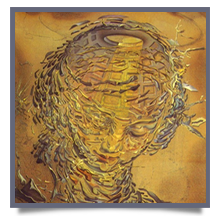Dissociation
It can be a good starting point to think of dissociation as a withdrawal and walling off, originally away from something that was “too much” or traumatic. Simply put Dissociation prevents the links between thoughts, feelings, memories and identity working as well as they should. It is considered a normal response to overwhelm and trauma. In severe cases it can lead to confusions about self and others, obviously in these cases it is very frightening to those who experience it.
In therapy we see mild symptoms of this more often than you might expect. Because it’s main characteristic is withdrawal (either into imaginary worlds or states with little sensory data, which commonly includes a bluntening of emotion), it means that therapy can be slower than normal, as people are not in contact with their thoughts and feelings. The emotional energy needed for change first must be brought to the surface and processed so that this energy can be utilised for living.
Dissociative Disorders
When Dissociation is utilized more broadly throughout the personality it is considered a Dissociative Disorder. Generally we understand this as a protective measure and care is taken to ensure a gradual reconnection to those parts of the personality that have been walled off or withdrawn from. There are a few types of Dissociative Disorder and it is important to get appropriate treatment for these types of issues.
Dissociation is something that can be resolved, and it does not have to become an ongoing part of the personality. If you or someone you know seems to be suffering this kind of problem, then psychotherapy with a specific focus on bodily experience along with safe and effective trauma resolution skills can provide a way through.
To discuss further or to make an appointment,
Call (02) 9067 2724, 10 A Boolwey St Bowral, NSW and Online
and ask for Julian Zanelli


